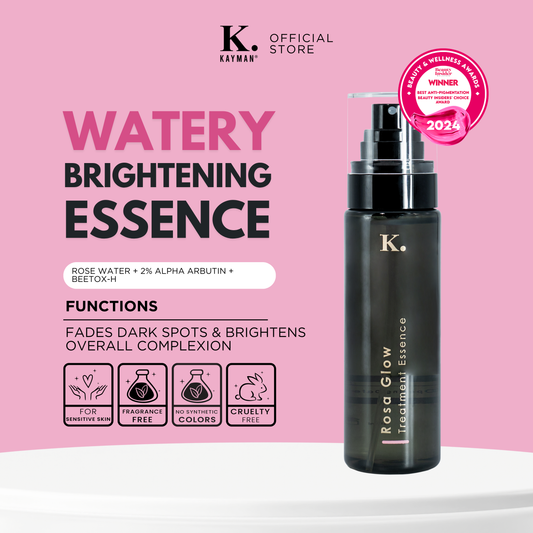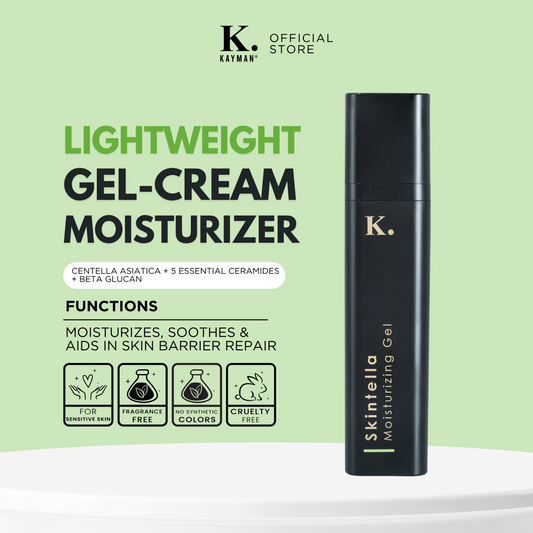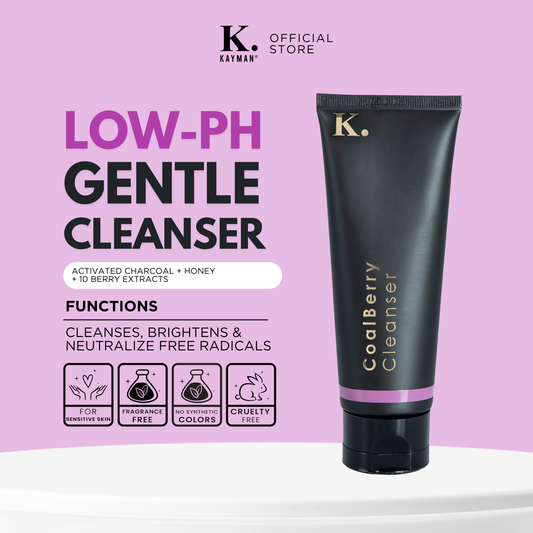WHAT IS THE SKIN BARRIER?
The skin barrier, or commonly referred to as the moisture barrier, is the outermost layer of skin which consists of cells and lipids. Think of a wall made of bricks and mortar; the bricks are skin cells called corneocytes, which protects our skin from the outside world. The mortar, on the other hand, is the intercellular matrix which is mainly composed of lipids. The skin barrier is almost non-permeable, to prevent loss of water and entrance of irritants.
A healthy skin barrier is important to maintain the moisture level of the skin and prevent damage caused by external factors. It serves mainly to trap water molecules and reduce transepidermal water loss (TEWL), by preventing natural moisturizing factors from escaping. It also helps to protect our skin from environmental stressors and potential irritants. The skin barrier is responsible for sustaining the skins’ overall health.

CAUSES OF SKIN BARRIER DAMAGE
When the lipids in the mortar are damaged or depleted, it will cause the barrier to weaken and become more permeable to irritants and allergens. Once these foreign contaminants penetrate the epidermis, they may trigger inflammation. This will then lead to skin problems such as dryness, tightness, breakouts and more.
What are some factors that cause the skin barrier to become impaired?
Use of harsh cleansers
Our skin has a natural pH of between 4.5 to 6.5. The usage of highly alkaline cleansers, with a pH level of 7 and above, will disrupt the natural pH of our skin. Prolonged use of harsh cleansers will force the skin to “give up,” making it unable to restore its natural pH.
Strong acne medication
The usage of acne medication such as benzoyl peroxide or topical retinoids may dry out the skin. Without a proper nourishing routine, constant use of such treatments may disrupt the barrier.
Over-washing and over-exfoliating
Those with oily, dehydrated skin may feel the need to cleanse repeatedly. Some even wash their face more than 5 times a day! However, excessive cleansing shouldn’t be a habit as it will force-strip the skin’s natural oils, making it unable to nourish itself.
Over-exfoliating, on the other hand, will force the skin to shed new cells at an unnaturally accelerated pace. This will cause unnecessary stress and lead to irritation.
Environmental stress
Change of climate and weather, as well as change of environment, can also affect the skin barrier negatively. For example, being in dry, air-conditioned spaces for a prolonged period may cause your oily skin to become dry. If not supplemented with appropriate skincare, it may lead to a damaged barrier in the long run.
Sun damage
Unprotected exposure, especially over a period of time, will cause the skin to become easily sensitized. This may lead to further skin barrier-related problems such as sunburn, dryness, peeling and tenderness, among others.
SIGNS OF BARRIER DAMAGE
A damaged skin barrier usually exhibits quite obvious signs, including:
- discomfort,
- redness,
- dryness,
- irritation,
- rashes,
- tightness,
- peeling; and other symptoms you’d associate with sensitive skin.
Unusually oily and dehydrated skin is one of the most common signs of barrier damage. This happens when the skin is unable to maintain its natural water-oil balance. It is commonly caused by aggressive skincare habits of stripping the natural oils from the skin, due to excessive usage of astringents, over-cleansing, or using harsh cleansers. Such an aggravated routine will force the skin to produce more oil to cope with moisture loss.
Once the skin barrier is damaged, moisture retention abilities will reduce drastically. As a result, water is lost quickly through transepidermal water loss (TEWL) and the skin will constantly experience a dehydrated sensation. TEWL is a natural occurrence, but excessive TEWL can result in unfavourable skin conditions.
Another telling sign of a compromised skin barrier is when the skincare products you’ve been using for a long time somehow irritates and causes inflammation to your skin.
WAYS TO RESTORE YOUR SKIN BARRIER
A compromised skin barrier means that your skin is unable to provide sufficient protection as its permeability has increased. In simpler words, irritants that your barrier would normally block out are making their way into the skin much more easily. A compromised skin barrier is like leaving the front door open for anyone to enter.
In order to fix the damage, it’s best to go on a “skincare diet.” This can be done by simply using fewer products in your routine and going back to basics:
- low pH cleanser
- hydrator
- moisturizer
- sunscreen.
Avoid using any products that may dry out your skin. This includes your beloved astringent toner with a high alcohol content, or witch hazel. You may also want to restrain yourself from using any form of exfoliants or active ingredients such as AHAs, BHAs, vitamin C and retinol during this period, as they can either stress out or worsen your skin.
Skip morning cleansing
This is a method made popular by beauty blogger and Krave Beauty founder, Liah Yoo. You can try to limit cleansing to once a day in the PM. This can help to reduce irritation experienced by your skin while you try to restore your moisture barrier. In the meantime, opt for more hydrating, barrier-friendly cleansers, such as our CoalFace Soap or CoalFace Cleanser.
Use barrier-restoring products
A compromised barrier calls for some changes in the skincare products you use. To get your barrier back on track, look for products that contain ceramides and fatty acids. Moisturizers such as the popular Cerave Moisturizing Cream and Ceradan Skin Barrier Cream are excellent choices.
As these elements are lipids, those with oilier skin may experience greasiness. If you prefer something lighter, try Dr Jart Ceramidin Liquid and seal everything in with your moisturizer of choice. Natural moisturizing factors such as panthenol (Vitamin B5) and niacinamide (Vitamin B3) also help tremendously in the process of restoring the skin barrier.
Use sunscreen!
Most importantly, always remember to put on sun protection every single day, even when you spend most of your time indoors. This is because UV rays are still able to penetrate windows and even curtains, and you don’t want to risk further damaging your delicate skin. Sun damage contributes greatly to skin barrier damage.
A HEALTHY SKIN BARRIER
The time needed to repair a damaged skin barrier depends on the severity of the damage and your skin condition. Some may take as little as 2 weeks, while others may need up to a month or more to restore their barrier function.
Once your skin barrier is back in full swing, you’ll notice a great improvement in terms of decreased redness and inflammation. Your skin will no longer experience extreme dryness or dehydration, and you’ll be able to tolerate numerous products with different ingredients without irritation. But of course, when it comes to product suitability and acceptance, it always depends on your individual skin tolerance.
XOXO,
Bunny & Fiqah












